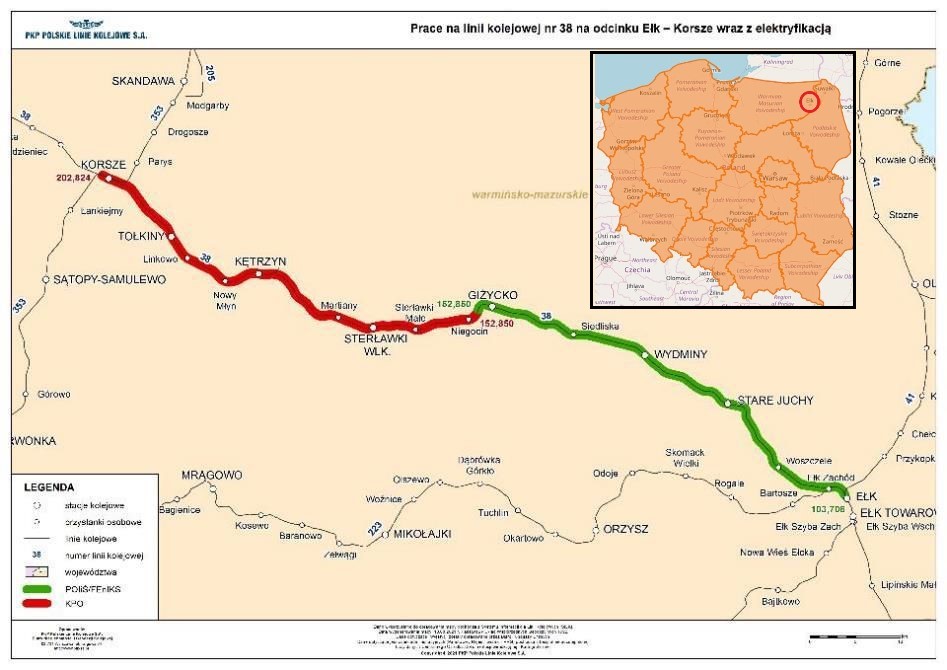The EU is funding the modernisation and electrification of the 49.144 km Ełk-Giżycko section of Poland’s railway line 38, under the first stage of a project to modernise the entire 99.118 km Ełk-Korsze section of the line.
- 13 January 2023
Further elements of the first stage are the securing of connection fees for six traction substations – Ełk, Stare Juchy, Siedliska, Sterławki Małe, Kętrzyn and Korsze – to supply power to the whole Ełk-Korsze section, and of construction permits for the Ełk-Korsze section. In the second stage, the Giżycko-Korsze section will be modernised and electrified.
Deteriorating infrastructure
Railway line 38 runs 241.5 km from Białystok to Głomno, in north-eastern Poland, near the Russian border. A standard-gauge, single-track line, the Ełk-Giżycko section is in an unsatisfactory and deteriorating state.
The Ełk-Korsze section is designed for train speeds of 80-100 km/h, but lower limits are in place on 90 % of it due to its poor condition, track instability and limited visibility of level crossings. Without modernisation, the line will no longer meet the needs of passenger and freight carriers.
Project components
Work in the first stage entails replacing or reinforcing the materials underneath the tracks, to allow for the passage of heavier trains, and reconstruction of the drainage system.
Tracks in stations will be reconfigured to enable them to accommodate 750 m-long freight trains. Three stations – Giżycko, Wydminy and Stare Juchy – and two stops – Woszczele and Siedliska – will be modernised. Two engineering facilities will be built and a further six rebuilt.
The project envisages construction of a complete catenary along the 49 km route and 6 sub-stations (Ełk, Stare Juchy, Siedliska, Sterławki Małe, Kętrzyn, Korsze) and reconstruction of non-traction energy lines and equipment.
The safety of level crossings will be improved by relocating 3 crossings, removing 2 and rehabilitating the remaining 22. Eight buildings will be demolished and a control room will be built at Giżycko station.
Overhead contact lines will be installed, supply lines will be laid, and connection agreements will be signed with the energy network operator. Electrical equipment for lighting and heating of points and telecommunications equipment will be modernised, and computerised traffic control devices will be installed. The laying of fibre-optic cable alongside the track will enable the implementation of the European Rail Traffic Management System.
Faster journeys
The project will increase maximum speeds to 160 km/h for passenger trains and 120 km/h for freight trains, thereby shortening journey times. An increase in line capacity will help to ensure more frequent and punctual regional services and inter-regional connections with western and southern Poland, and better connections with other modes of transport.
Better rail connectivity is vital for the Giżycko area, which is a key economic centre generating freight traffic and a tourist destination in summer because of its location in the Masurian Lake District.
By making the railways more competitive, cost-effective, accessible and safe, the project will reduce the environmental impact of transport. Road safety will also be enhanced thanks to the work on level crossings. Travel facilities will be adapted to the needs of people with disabilities, and the upgrades will help to prevent vandalism of infrastructure.
Finally, as the line is part of the comprehensive Trans-European Transport Network (TEN-T), TEN-T interoperability requirements will be met to ensure operators from other countries can access Polish railway infrastructure.
Total investment and EU funding
Total investment for the project “Works on railway line 38 between Ełk and Giżycko, including electrification” is EUR 229 794 563, with the EU’s Cohesion Fund contributing EUR 145 231 396 through the “Infrastructure and Environment” Operational Programme for the 2014-2020 programming period. The investment falls under the priority “Development of rail transport in Poland”.

